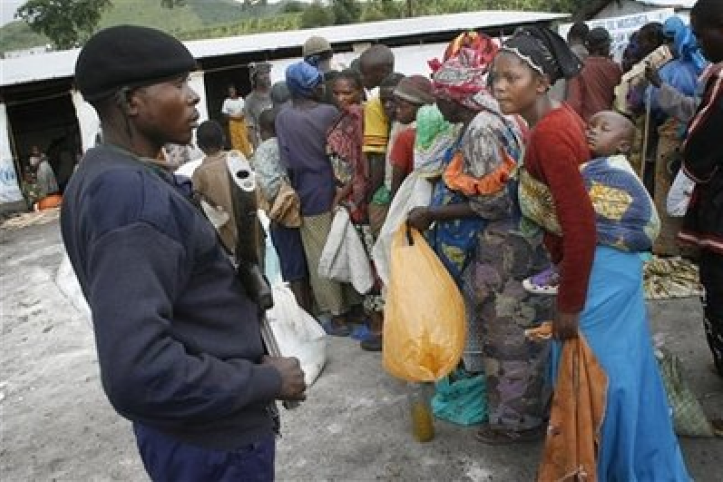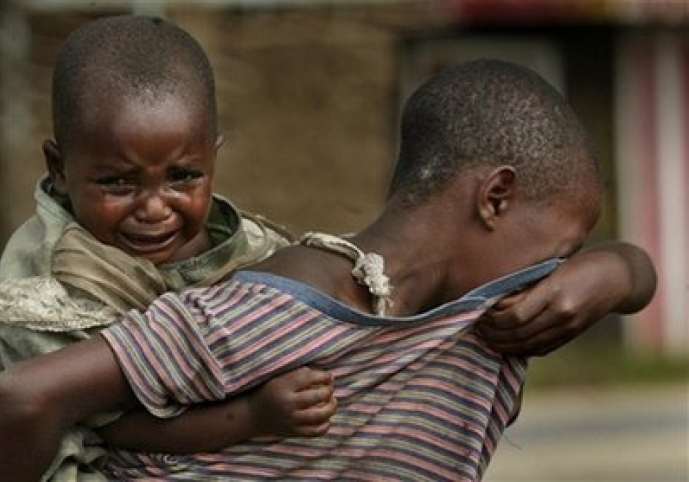The unrelenting fight between the rebel force loyal to Laurent Nkunda and the pro-government militia in eastern Democratic Republic of Congo led to renewed calls for more humanitarian aid and U.N. peacekeeping troops this week.
Aid groups are reporting widespread hunger and food insecurity in conflict-affected regions of the central African nation that has been at war since 1997.
International humanitarian group World Vision reported that the number of children suffering from malnutrition has soared as a result of increased conflict, with one hard-hit area seeing a ten-fold increase in the number of children under the age of five who are malnourished.
“The cause of malnutrition used to be poverty,” said Suzanne Kahamba, a local nurse working at the World Vision nutrition center in the DRC. “But now so many people are displaced, they don’t have land to grow crops. The conflict has intensified the effects of poverty ten times over and the situation has become dire.”
Before the conflict, nutrition experts admitted about one or two malnourished children per day at the World Vision nutrition center in Rwanguba in eastern Congo. Since the fighting affected the area, between eight and ten children have been arriving every day.
World Vision calls the conflict raging in DRC the deadliest since World War II.
“The last decade of conflict has resulted in some 4 million deaths; an estimated 1,200 people die every day due to ongoing epidemics and war-related causes; some aid agencies estimate upward of 1,400 deaths per day,” the Christian aid group said in a statement.
World Vision reported this week that it was finally able to deliver therapeutic food for children at the clinic. Fighting in the area had cut the center off from aid for nearly three weeks.
The Christian ministry will also provide more than 100 tons of food to affected communities over six months, including beans and maize to almost 4,500 people.
Congo has a long and bloody history of fighting, but it was in August that the conflict between Nkunda and government forces intensified.
Rebel leader Nkunda and his National Congress for the Defense of the People (CNDP) force claim they are fighting to protect Tutsis from Hutus who escaped to Congo after Rwanda’s 1994 genocide.
But critics accuse Nkunda of using that as an excuse to hide his real motive of gaining power. His troops have taken control of land masses in eastern Congo.
Two days ago, the rebels had deliberately retreated and the United Nations had hoped it could broker peace during the cease in fighting. But the conflict broke out again on Thursday.
Also on Thursday, the U.N. Security Council unanimously voted to send about 3,000 more U.N. troops to the DRC to help prevent further fighting in the country’s east, according to Reuters.
"Since August 28, fighting has intensified in many areas, causing deaths, rapes, lootings, forced recruitment and further displacements of civilian populations," the local coalition of 44 organizations in eastern Congo wrote to the Security Council on Tuesday to plead for more troops, according to CNN.
"The population has thus been immersed in unspeakable suffering. In the last few days, fighting has drawn closer to large populated areas, such as the town of Goma. Fighting has also invaded and torn apart the region of Rutshuru, particularly in the town of Kiwanja, where hundreds of civilian deaths have now been recorded."
British aid group Oxfam said in a statement last week that the “world is failing in its responsibility to protect Congo’s innocent civilians.” Oxfam also reported incidents of forced labor, rape and widespread brutality inflicted upon civilians.
Congo is home to the world’s largest U.N. peacekeeping operation and will have more than 20,000 troops and police after the additional troops are deployed.
Its infamous 1998-2002 war, which was the largest war in modern African history that involved eight African nations and some 25 armed groups, resulted in an estimated 5 million deaths, according to some estimates.
The recent conflict in eastern Congo, which is about the size of France, has displaced more than a quarter of a million people.
Lynne Hybels, advocate for Global Engagement at Chicago-area megachurch Willow Creek Community Church and wife of the church’s pastor Bill Hybels, has called on Christians to be more involved in helping victims of the Congo conflict.
“In the Congo, a major weapon of mass destruction is rape. In some villages as many as 95 percent of the women and girl in that village have been raped,” Hybels said in a video posted on the Web site of Christian aid group World Relief.
Hybels and World Relief urge Christians to do three things: learn more about what is happening, to pray for the country and its people, and to donate financially to help support the displaced civilians.
The Anglican Church, meanwhile, has called for a day of prayer for peace in the Congo this Sunday, Nov. 23.









